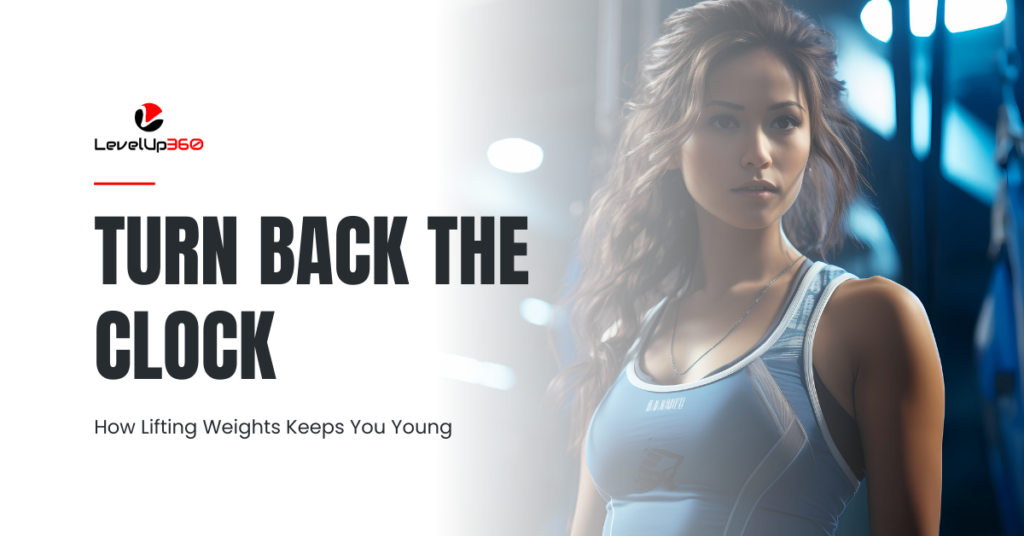
Turn Back the Clock: How Lifting Weights Keeps You Young
Have you ever wondered if there’s an exercise elixir to help you live not just longer, but better? A way to keep your body and mind vigorous well into your later years? As it turns out, resistance training just might be the closest thing we have to a real-life fountain of youth.
New revelations from exercise science research position strength training as a pivotal pillar of lifelong health. Properly structured weight lifting provides unmatched benefits for enhancing the quality of life as you age. It defends your body against decay and dementia far more effectively than our traditional reliance on steady-state cardio exercise alone.
So how specifically does progressively overloading your muscles help you defy physical and cognitive decline? Let’s explore the mounting evidence that strength training extends health span by optimising hormones, metabolism, cognition, disease resilience, and longevity.
Strength training allows you to keep doing everything you want in life on your own terms by defying physical decline
Debunking Strength Training Myths
If resistance exercise provides such astounding benefits, why have we overlooked it for so long in exercise recommendations?
Mainly because strength training has long battled misconceptions, especially among women, that it will make you “bulky”, “muscle-bound” and injury-prone. But it’s time to debunk these pervasive myths.
While lifting absolutely builds muscle, it takes very strategic programming focused on extreme hypertrophy to gain substantial mass. Properly structured strength training makes women strong, lean and powerful – not bulky.
Full-range resistance moves enhance mobility, unlike cardio machines that lock you into the same motion. Weight lifting strengthens connective tissues and stabilizes joints through complete ranges of motion. Flexibility without stability raises injury risk.
You can continue lifting safely even into your 90s. Studies prove resistance exercise provides even greater anti-ageing effects as we age. It’s never too late to start.
Finally, you don’t need to spend tedious hours in the gym to reap results. Research confirms just 2-3 focused 30-60 minute lifting sessions per week deliver substantial benefits.
The antiquated stigma surrounding strength training (especially for women) can finally be put to rest. The facts clearly justify prioritising progressive resistance as the cornerstone of every exercise program.
Muscle - The Metabolic Engine
Skeletal muscle is an extremely metabolically active tissue. The more lean muscle mass you carry, the higher your daily calorie burn thanks to your larger and more powerful metabolic engine. Strength training potently builds muscle while also enhancing the body’s ability to mobilize fat stores. This synergistic “recomposition” effect allows sustainable fat loss.
But muscle provides health benefits far beyond a faster metabolism. Your muscles actively produce and release various proteins called “myokines”. These myokines combat chronic inflammation, improve insulin sensitivity and blood glucose regulation, support the formation of new blood vessels, and provide numerous other protective effects against metabolic disease.
Conversely, loss of muscle mass and function through the insidious age-related decline known as sarcopenia feeds directly into frailty, disability, lowered immunity and progression of degenerative conditions. Think about it – if you’re 45 now for example, how much precious muscle have you already forfeited compared to your vibrant 30-year-old self? What does this inexorable muscle loss imply for your health downstream if the atrophy remains unchecked?
Preserving and building muscle as we age provides a real-life force field protecting metabolism, physiology and vitality. So take your weight lifting seriously – your muscles sustain your health span as well as your lifespan.
The Anti-Aging Effects of Resistance Training

Beyond burning calories, strength training confers regeneration effects that quite literally turn back your biological clock. The variety of movements, complexity and intensity of lifting weights challenge your muscles, bones and brain in a way that other forms of exercise don’t.
Multi-joint resistance moves force your largest and most powerful muscle groups to coordinate and generate force in ways our bodies evolved to thrive on. This is the difference between “exercising” on a machine in a static range of motion versus truly “training” by moving weight through full kinetic chains.
The anabolic stimulus of resistance training elevates youthful hormone levels that naturally decline with ageing. Growth hormone, testosterone, insulin-like growth factor-1 and DHEA get boosted back toward more optimal levels. This has implications for enhancing body composition, metabolism, cognition, libido, energy levels and overall vitality.
In addition to burning visceral belly fat, lifting weights specifically builds stronger bones to prevent osteoporosis and fractures. Weight-bearing exercise triggers increased bone mineral density to structurally adapt to greater loads and impact.
Resistance training also enhances insulin sensitivity, blood lipid profiles, resting blood pressure and other key markers of cardiometabolic health. Combining strength gains with sensible cardio provides heart health benefits without the injury risks of excessive endurance training.
Finally, lifting combats anxiety, depression, psychological stress and mood issues effectively. The self-esteem and confidence-boosting mind-body benefits give resistance training an edge in enhancing mental health and resilience.
Consistency is key to maximizing anti-ageing effects. But it’s encouraging to know starting a strength training program at any age can still massively turn back the clock on your health, function and vitality.
Lift Weights to Keep Your Brain Sharp
Did you know your muscular strength directly influences your mental strength? Resistance training doesn’t just transform your body composition – it also provides cognitive enhancement and neuroprotective effects against dementia risk.
The multi-dimensional, technically complex nature of weightlifting challenges the mind, unlike other repetitive forms of exercise. Balance, coordination, control, spatial orientation and kinetic chain explosiveness get integrated to execute lifts properly and safely.
Studies demonstrate that strength training boosts memory, attention span, processing speed, focus and executive function more than traditional cardio exercise. The variety of movement patterns crossed with the intensity of loading provides a unique neural stimulus.
Remarkably, research confirms resistance exercise even rivals medications and cognitive training for improving aspects of memory, reasoning and task performance in adults with mild cognitive issues and dementia.
If you want to avoid, or at least delay, cognitive ageing, consider a “lift weights first” approach. Maintaining muscular fitness preserves mental fitness – so keep your body and brain engaged as you progress through purposeful strength programming.
Strength Training Extends Your Functional Years

While managing heart health risks has been the conventional focal point, resistance training delivers total body benefits improving functional longevity and resilience. Slowing physical decline ensures you stay active, uninjured and independent into your later years.
Building balance, proprioception, bone density, joint integrity and full-range strength prepares your body to withstand stresses and avoid catastrophic injuries from falls as you become more frail.
Strengthening connective tissues nourishes tendons, ligaments and fascia that deteriorate over decades of disuse. Reinforce your anatomical infrastructure before neglect and ageing instigate painful overuse injuries.
Maintaining neuromuscular coordination preserves reflexes and motor control required to catch yourself from a stumble or navigate stairs confidently. Continue relying on your body efficiently versus needing workarounds to compensate for deficiencies.
Consider focusing more on mastering movement quality over workout quantity as your fitness emphasis evolves. Allow your joints to dictate safe ranges of motion rather than forcing range and suffering consequences.
Lift weights consistently to keep your muscles, bones and connective tissues biologically younger for decades longer.
Take a Strength-First Exercise Approach
Optimising exercise for health, function and longevity requires a paradigm shift for many – prioritising resistance training. Fortunately, the formula is straightforward:
1. Make Strength Training Your Exercise Cornerstone -Lift weights 2-4x weekly focusing on major compound exercises performed for several sets of 5-15 reps. Progress load, volume and complexity over time.
2. Include Cardio For Health Not Calories – Incorporate aerobic exercise 2-4x weekly – running, cycling, swimming etc. Focus on increasing fitness versus burning calories which can be counterproductive.
3. Allow Proper Recovery – Ensure that you provide your body with enough nutrients, sleep, etc… so you can recharge. Prioritise sleep, nutrition and stress management.
4. Customise to Your Needs – Implement pain-free movement patterns tailored to your orthopaedic health, mobility restrictions and recovery capacity. Safety first.
Adapting this strength-centric blueprint aligns your workouts with science for greater impact on body composition, disease protection, function and longevity.
It's Never Too Late to Start
While the ideal lifelong fitness approach starts building your physical strength and resilience in your 20s and 30s, it’s never too late to begin reaping the rewards from resistance training. Consistency matters far more than your age when it comes to re-igniting your vitality.
Studies prove lifting weights provides substantial anti-ageing health and mobility benefits even for inactive seniors just starting out in their 70s, 80s and beyond. Reversing lifestyle frailty and muscle wasting requires dedication, but sticking to a thoughtfully designed program works wonders.
Yes, regaining lost muscle mass presents more biological challenges after 50 or 60 as hormones, protein processing and stem cell activity diminish. However, patient, progressive training adapted to your recovery capacity and risk profile still produces major improvements in quality of life.
The outdated notion that strength training is only for the young needs to be put to rest. It’s time to embrace resistance exercise as a vital part of lifelong health. Lifting weights provides unmatched benefits for maintaining strength, independence and vitality as we age.
You don’t need to be a professional athlete or bodybuilder to start resistance training. Begin with easy-to-learn compound movements using your own body weight, bands or light weights. Build up gradually over time. Be patient and focus on proper form.
Commit to a regular strength training program catered to your needs and abilities. Seek guidance from a qualified trainer if needed. Support your muscles and bones now so your future self can continue doing all the activities you love.
It’s never too late to incorporate resistance exercises. Strength training allows you to keep doing everything you want in life on your own terms by defying physical decline. Don’t let outdated misconceptions hold you back from a stronger, healthier and more empowered ageing journey.
Recommended reading
Recommended reading
Additional Resources
Feeling in control of your health
If you are interested in improving your health and wellness, check out other resources such as Our Blog, Free Resources and/or join our private Body-Mind Transformation Secrets Community on Facebook, and go on an even deeper dive with me to uncover how to succeed in your health and wellness goals.
You may also be interested in our Sleep Secrets Cheat Sheet. It is a great resource with strategies to fix and optimize your sleep which is crucial to succeeding in your health and wellness goals.
Resources
Pictures
Freepik.com and vecstock








